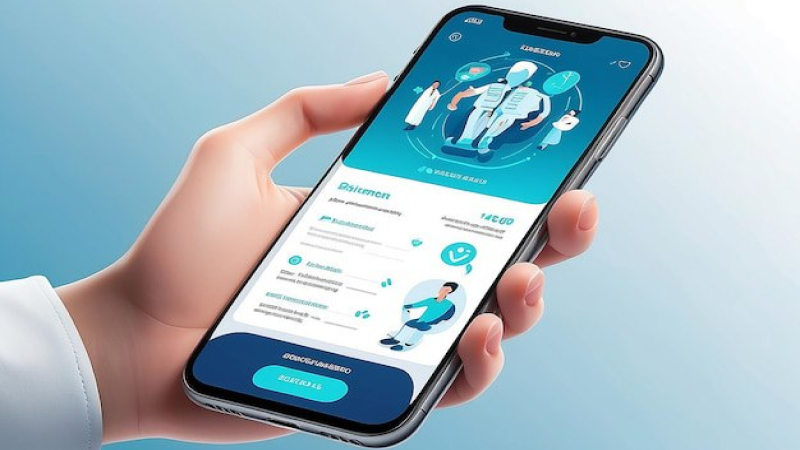Healthcare App Testing: A Step-by-Step Guide to Ensuring Safety and Efficacy

The healthcare sector is seeing a substantial shift propelled by technology breakthroughs. Mobile devices have become commonplace in healthcare settings, leading to growth in the development of fast medical software applications. The development of mobile applications in the healthcare industry has made significant progress since their introduction. These apps have progressed from basic information-providing tools to advanced ones capable of monitoring health, facilitating virtual consultations, and keeping track of medication. Key advancements in this progression include the creation of electronic health records (EHRs), telemedicine, and the incorporation of wearable devices into medical software applications. The sensitive nature of healthcare data and the critical need for reliable performance make thorough testing of these programs imperative. Proper testing ensures that healthcare apps function correctly, securely, and in compliance with regulatory standards. That’s why this article contains the information necessary for proper medical software examination.
Potential Weaknesses of Healthcare Apps

To understand why it is vital to test healthcare software, have a look at the disadvantages of such tools. It involves more than healthcare domain testing, for example:
Failure to comply with HIPAA requirements and GDPR
Healthcare rules change frequently to improve accessibility and efficiency. Consult the legal team to guarantee the healthcare app meets the latest regulations. Developers of healthcare apps also struggle with HIPAA's line of action. Ignoring app layout planning is a typical developer mistake. Failure to comply with HIPAA, HL7, FDA, or other standards can result in criminal charges, fines, and penalties. These charges can cost the company a lot and lose user trust.
Poor app performance
Another critical weakness of healthcare apps is poor performance, which can manifest as slow loading times, frequent crashes, or unresponsive features. Given the vital nature of healthcare information, any lag or malfunction in an app can have serious consequences, such as delayed treatment or incorrect data entry. Poor app performance not only frustrates users but also undermines trust in the technology, making it less likely that patients or providers will rely on the app for critical healthcare needs.
Patient safety and data security
The medical data of the individual is perpetually collected and analyzed by the health apps. The hacker's potential to expose confidential information and share it with third parties is a significant concern. Medical data leakage has been the subject of news and updates from the manufacturers of the reported apps in numerous instances over the past few years.
Incompatibility with existing healthcare systems
One of the primary concerns with healthcare apps is their potential incompatibility with existing healthcare infrastructure. Many healthcare systems rely on established electronic health records (EHR) and other medical software, which may not seamlessly integrate with new applications. This lack of compatibility can lead to fragmented data, miscommunication, and inefficient workflows, ultimately compromising the quality of care provided.
User-unfriendly UI and UX
The complexity of implementation and integration in healthcare app development is widespread, despite the fact that a big number of individuals have mobile devices. A mobile health solution that is difficult to build and integrate with the system that is already in place is something that is not user-friendly. In order to achieve the desired level of efficiency, the app's user interface will be overly convoluted.
Incompatibility with wearable devices
Wearable devices, such as fitness trackers and smartwatches, have become increasingly popular for monitoring health metrics. However, healthcare apps that fail to integrate with these devices can miss out on valuable data that could enhance patient care. Incompatibility between apps and wearable devices can lead to incomplete health monitoring, reducing the app's overall effectiveness and the user's ability to make informed health decisions.
Types of Testing
 To overcome issues associated with weaknesses of healthcare applications, one should examine them using different approaches. There are various types of healthcare software testing, each designed to evaluate different product aspects, from its functionality and performance to security and user interface. Understanding these testing types is essential for delivering a high-quality, reliable product that stands out in a competitive market.
To overcome issues associated with weaknesses of healthcare applications, one should examine them using different approaches. There are various types of healthcare software testing, each designed to evaluate different product aspects, from its functionality and performance to security and user interface. Understanding these testing types is essential for delivering a high-quality, reliable product that stands out in a competitive market.
- Functional Testing: a form of testing that aims to determine if each element of an app functions according to the software requirements. In functional testing for healthcare apps, each function is evaluated against the associated criteria to determine if its output aligns with the expectations of the end user.
- Usability Testing: involves having real people use a website, app, or other product and evaluating their reactions. Usability testing for healthcare apps is essential to creating an effective and delightful user experience, whether by examining session records or renting a lab with eye-tracking equipment.
- Security Testing: entails the evaluation of security features and mechanisms, the verification of the software's adherence to security standards, and the execution of penetration tests to identify vulnerabilities and deficiencies.
- Interoperability Testing: checks the communication and compatibility of various devices, systems, and apps. This stage of testing healthcare software guarantees stable and consistent operation and data transmission across a range of platforms and situations.
- Compliance Testing: also known as conformance testing, the purpose is to evaluate whether or not a software product, method, computer program, or system satisfies a predetermined set of internal or external standards.
- Clinical Validation: involves verifying the accuracy of medical calculations and algorithms to ensure they provide correct diagnoses, treatment recommendations, or health metrics. Additionally, testing with real patient data is essential to evaluate the app's performance under authentic conditions, identifying potential issues that could affect patient care. Collaborating with healthcare professionals during the application testing process is equally important, as their expert feedback helps refine the app's functionality and adherence to clinical standards.
Step-by-Step Testing Process
Here is what the process of testing healthcare applications looks like.
- Unit Testing: a method of testing a unit - the smallest subset of code that can be logically separated from the rest of the system. An example of this would be a function, a subroutine, or a method.
- Integration Testing: I&T is a subset of software testing whereby the several components, modules, or units of a medical software application are tested as a whole. Different programmers may, however, code these modules.
- System Testing: A comprehensive testing process that evaluates the entire integrated system to ensure it meets the specified requirements and functions correctly.
- Acceptance Testing: The final testing phase where the software is tested against user needs and requirements to determine whether it is ready for deployment. Acceptance testing for healthcare apps ensures the product meets the agreed-upon criteria before going live.
- Beta Testing: A pre-release testing phase where a version of the software is made available to a limited group of users outside the development team to identify any remaining issues or bugs in a real-world environment.
The Role of Crowd Testing for Healthcare

Crowdtesting has emerged as a powerful approach in healthcare app testing, offering several distinct advantages that enhance the reliability and quality of these critical applications.
Leveraging diverse testers for broader test coverage
Crowdtesting brings together a wide range of testers from different backgrounds, locations, and technical expertise. This diversity allows healthcare apps to be tested across various devices, operating systems, and user environments, ensuring broader test coverage. By tapping into this varied pool of testers, developers can uncover issues that might not surface in more traditional, homogeneous testing environments.
Identifying edge cases and unexpected behaviors
Healthcare apps must perform reliably under all circumstances, including rare or extreme scenarios. Crowdtesting is particularly effective in identifying edge cases and unexpected behaviors that might be overlooked during standard testing processes. With a large and diverse group of testers, the likelihood of encountering and addressing these unique situations increases, ultimately leading to a more robust and resilient application.
Cost-effective and scalable testing solutions
Compared to traditional in-house testing methods, crowdtesting offers a cost-effective and scalable solution without sacrificing quality. By leveraging a global community of testers, companies can conduct extensive testing without the need for significant infrastructure or resources. This scalability allows for more comprehensive testing, even on a tight budget, making it an attractive option for healthcare app developers looking to optimize both costs and outcomes.
Real-world feedback for continuous improvement
One of the key benefits of crowdtesting is the real-world feedback it provides. Testers use the app in real-life, authentic, everyday scenarios, offering valuable insights into usability, functionality, and overall user experience. This feedback is crucial for continuous improvement, helping developers refine the app to better meet user needs and expectations. In the fast-evolving field of healthcare technology, this ongoing input is essential for maintaining a high-quality, user-centered product that adapts to evolving needs.
Targeted Testing by Demographic
Crowdtesting enables precise targeting of specific user demographics relevant to your healthcare app's goals. Whether you're focusing on age, location, medical condition, or other crucial factors, you can select testers who mirror your target audience. This approach ensures that the feedback you receive is highly relevant and actionable, helping you tailor the app to better serve the needs of the specific users it's designed for, leading to a more effective and user-centered product. Crowdtesting, with its wide-reaching benefits, plays a vital role in ensuring that healthcare apps are reliable, effective, and user-friendly, ultimately contributing to better health outcomes.
Conclusion
To sum up, the regulatory demands and delicate character of patient data make healthcare application testing of the utmost importance. The significance of thorough testing that addresses functionality, security, performance, and user experience is highlighted by the vulnerabilities that have been discovered. Organizations may strengthen healthcare apps against risks and keep up with standards in this vital domain by adopting essential testing types and following best practices. Crowdtesting offers significant advantages in healthcare app testing by providing broader test coverage, identifying edge cases, and delivering cost-effective, scalable solutions with real-world feedback. Ubertesters, with its extensive experience and specialized capabilities in healthcare software testing services, enhances these advantages by leveraging a global network of expert testers, including those with healthcare backgrounds. This ensures comprehensive testing that meets industry standards, regulatory requirements, and user expectations. Looking to dive deeper into the benefits of crowd-testing? Reach out to us at sales@ubertesters.com for an in-depth exploration.

